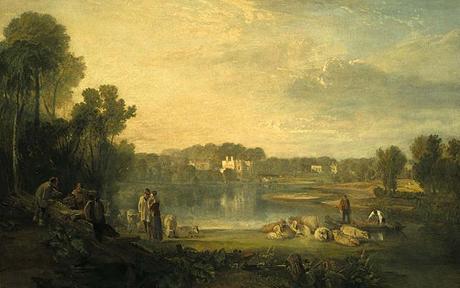 |
| Pope's Villa at Twickenham by J.M.W. Turner (1808) Public Domain via Wikimedia. |
 An Essay on Criticism by Alexander Pope
An Essay on Criticism by Alexander PopeMy rating: 5 of 5 stars
There are a number of famous phrases in this essay:
To err is human; to forgive, divine.
A little learning is a dang'rous thing.
For fools rush in where angels fear to tread.
And I learnt a new word: "coxcomb" - an archaic term for a dandy. Pope draws on numerous place names as synonyms for The Ancients, so Aristotle is "the Stagirite"; Virgil is "the Mantuan Muse"; and,
To copy nature is to copy them.
After reading a few articles by and about Harold Bloom, having almost finished John Ruskin's On Art and Life, and having made a start on Oscar Wilde's The Critic as Artist, I have gained an appreciation for the work of the critic. Pope points out that Aristotle was a critic of Homer, and Maevius, known for his criticism of better writers (and of Augustus Caesar's vintage), was well-critiqued by both Virgil and Horace. Pope provides advice for the genius, too:
Launch not beyond your depth, but be discreet, And mark that point where sense and dulness meet.
and
One science only will one genius fit; So vast is art, so narrow human wit.
Our talent requires constant effort, and spreading ourselves too thin means:
Like kings we lose the conquests gain'd before.
Reading is important (especially to "know well" the Ancients), and we should:
Read them by day, and meditate by night.
I could feel Mortimer Adler lurking in the background, and a return to How to Read a Book revealed Pope's sentiments (p. 11):
There have always been literate ignoramuses who have read too widely and not well.
As Pope said:
The bookful blockhead, ignorantly read, With loads of learned lumber in his head.
But Pope also touches on the problem for converting sound reading into writing (which is increasingly my problem):
That on weak wings, from far, pursues your flights; Glows while he reads, but trembles as he writes.
Adler spoke of "coming to terms with the author", and Pope seems to be Adler's inspiration:
A perfect judge will read each work of wit With the same spirit that its author writ
Yet Pope draws on the folk tradition, too, especially in relation to the "father" of all sins, pride, "the never-failing vice of fools"; and Socrates' notion of the more we know, the more we know we don't know much ("New, distant scenes of endless science rise!"). In effect, Pope argues that pride prevents reason. If pride can be driven away, then we can use feedback from friend and foe alike to correct our faults. The Stoics, too, can be seen in the background, with echoes of Epictetus' (Discourses 3.24.17) warning that happiness and yearning for something one doesn't have are incompatible, in effect, perfectionism is desiring the impossible, reflected in:
Whoever thinks a faultless piece to see, Thinks what ne'er was, nor is, nor e'er shall be.
Nietzsche gets a guernsey, too, or, should I say that Nietzsche draws on Pope's Dionysian-ness ("Dennis of the Grecian stage"). There is so much in this essay that a second and third reading will be rewarding. And not just for lessons in literature and history - geography, too. As it turns out, London's Duck Lane (not the current Duck Lane, which Google Maps shows is an alley), now known as "Little Britain", was in Pope's time an area for second-hand booksellers, and before that an area for publishers, too. There is so much in Pope that is familiar, much like John Stuart Mill's On Liberty (which is like reading my own mind, the content is basically the liberal arts curriculum of a modern education). But the difference is that Pope's work requires a more thorough reading of the Great Books. While I have much more to learn about the classics, it is clear that the more familiar one is with them, then the more rewarding a reading of Pope will be.
And what about the Glorious Revolution? The Westminster political system begins with the end of the old regime in 1688, thanks to William of Orange. Alexander Pope was born in 1688. So there you go.
 Donate
Donate




